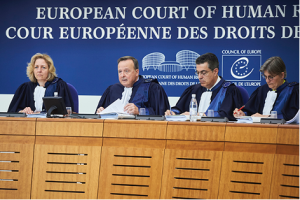By: Jamie McLennan
Impunity Watch Staff Writer
STRASBOURG, France– On October 14, 2020, the Grand Chamber of European Court of Human Rights heard the case NIT S.R.L v. Republic of Moldova after the initial chamber relinquished jurisdiction to the Grand Chamber. According to Article 30 of the ECHR, the chamber in which the case was initially selected, may relinquish their jurisdiction if the issue before the court raised a serious question that requires interpretation of the protocol or prior resolutions by the ECHR.

The applicant party, Noile idei televizate SRL, was a private television station located in Moldova since 1996. Beginning in 2004, the station received its license to broadcast nationally and the station allegedly has a close relationship with the Communist Party of Moldova, who held power until 2009. Between 2009-2011, the television station repeatedly broadcasted news that favored the Communist Party and as a result, received multiple sanctions for breaching legislation in Moldova that imposed duties of fairness and neutrality in the news. In particular, the television station was accused of politically biased news, favoring oppositional political parties and promoting fake and biased media. After the television station was sanctioned eleven times by the audio-visual national authority, the television station’s license to operate was withdrawn and the station could no longer publicly broadcast in Moldova since 2012.
In 2013, the television station challenged the sanctions through the court system, but the action was dismissed as unsubstantiated. The Court of Appeal affirmed the decision, stating that the harsh sanctions were likely founded, given that the station refused to comply after many warnings. The television station then sought remedy through the European Court of Human Rights and the Moldovan Government was notified of the application in April of 2018.
Here, the television station believed that they had formal complaints against the Moldovan Government under Article 6 (right to a fair trial), in which the revocation of the licensure was unfairly given due to the television station’s critical attitudes of the Moldovan Government. And, the television station also complained under Article 10 (freedom of expression), in which they argued that domestic law should not be able to impose an obligation of neutrality and fairness on privately owned stations that broadcast publicly. They further alleged that this action would constitute a breach against ownership of their broadcasting network, as stated under Article 1 of Protocol No. 1 (protection of property). They asked the court to review the issues and determine the power balance between a state’s protection of plurality and private enterprises that wish to freely express political messages. The ECHR would have to delineate between domestic and international standards for news and media, determining which area of governance should hold more power. Although the court held an initial hearing on October 14th, the case is still pending judgment before the Grand Chamber.
For further information, please see:
European Court of Human Rights- Forthcoming Hearings in October 2020- 10. Jan. 2020
European Court of Human Rights- Information Note on the Court’s Case Law- Mar. 2020
European Court of Human Rights- Press Release- 3. Sept. 2020